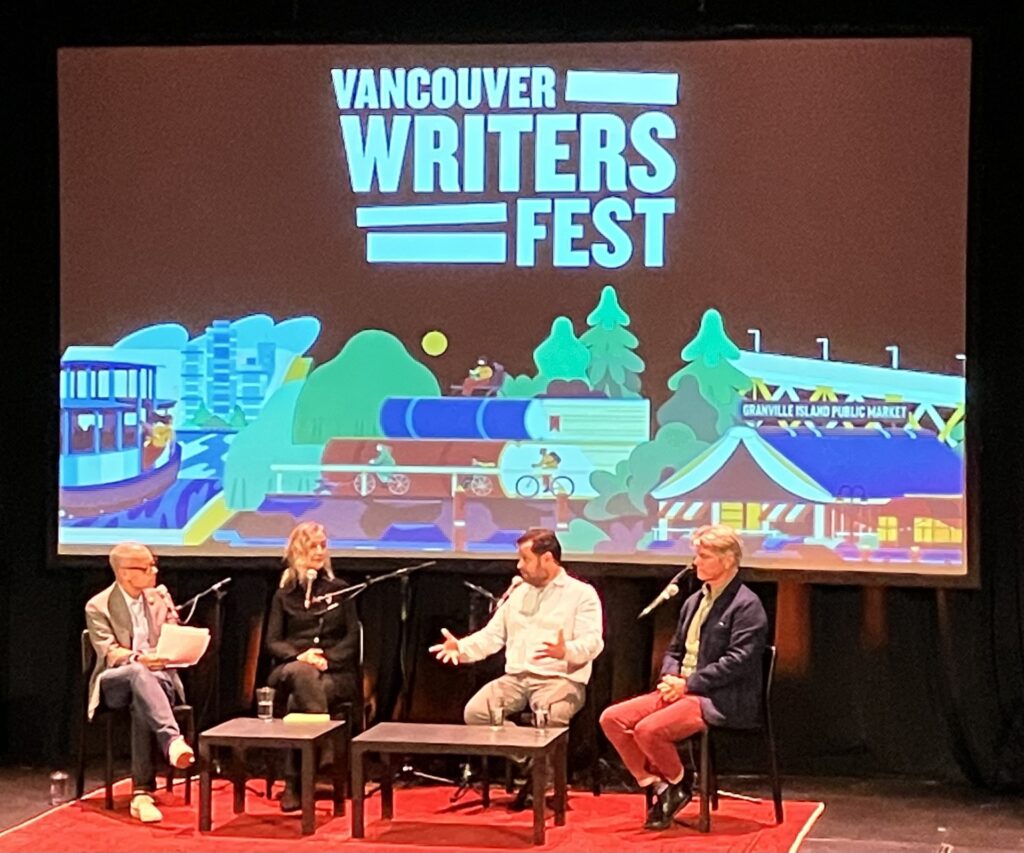by Tracy Sherlock

Renewable energies are cheap and ubiquitous, and the clean energy transition is happening with astonishing speed.
It may not always seem that way, but three authors with long resumes related to climate change all expressed that opinion in October at the Vancouver Writers’ Fest, which chose to close its 2023 festival with a sold-out event focused on the climate crisis.
Rebecca Solnit, essayist and co-editor of Not Too Late: Changing the Climate Story from Despair to Possibility, John Vaillant, author of Fire Weather: A True Story from a Hotter World and Chris Turner, author of How to Be a Climate Optimist, were interviewed by Matt Galloway, host of CBC’s The Current.
“We are all climate communicators,” Solnit said, reminding everyone of their responsibility to work towards a positive future, even though we don’t know exactly what that future will look like. “Obviously we need to dismantle the fossil fuel industry, we need to make a swift energy transition, but we also need to change how we measure abundance, how we imagine what the good life looks like, what we value. It’s partly an imagination crisis.”
American author Solnit is the author of more than 20 books, including Hope in the Dark and Men Explain Things to Me.
In some ways, the crisis is a “storytelling crisis,” she said.
“The future does not exist. We are making it in the present with what we do or fail to do.”
Powerful institutions don’t begin the process of change, but they eventually cave to a new reality, created by grassroots movements, she said.
“They are not leaders. They are the very end of the process. They are sweeping up after our parade. But you’d better f****** parade,” she said.
Canadian author Turner, the author of five books on technology, energy and climate, said people may feel very threatened by the energy transition, but the status quo is already giving ground to the concept that a zero carbon future is required.
“The energy transition we’re going through right now is happening much faster and much more deliberately than any one we’ve experienced before. These are processes that have historically taken hundreds if not thousands of years,” Turner said. “Obviously doing that is going to disrupt a lot of stuff that people are invested in.”
Vancouver author Vaillant, author of several non-fiction books including The Golden Spruce and The Tiger, as well as a novel The Jaguar’s Children, recently spoke to a special session with the House of Commons natural resources committee. He agreed that politicians don’t spur the change, they “kind of grab the coattails and maybe take some credit eventually.”
Humanity is in a “2007 smartphone moment” with renewable energy, he said. In 2006, no one had one, but by 2009 young children even had smartphones. Renewable energy will be the same, he said.
His most recent book is about the devastating 2016 Fort MacMurray fires, during which it was so hot even steel melted. He was blown away by a photograph of tulips.
“There’s this astounding otherworldly resilience that is integral to the Earth,” he said. “The place burned, was simmering for days. I got a photograph from an insurance agent of this graveyard of crumbling concrete and ash, and thrusting up through the ash are these tulips — yellow and red with green leaves — it was like nothing had happened.
“It was so victorious and beautiful. People planted those without knowing. To me, there’s a real lesson in that: you really don’t know what’s going to happen.”
That comment echoes Solnit’s message that it’s not too late and that giving up is the luxury of the privileged.
“Why would you give up? Giving up to me is a dishonorable, lazy way to live,” Solnit said. “You should live your life with valor, you should live your life with commitment, you should live your life knowing that you don’t know what the future will look like. Ten years ago, we did not have viable alternatives to fossil fuel the way we do now.”
The Kwantlen Climate+ Challenge is hosting a book club on Nov. 15 from 2:30 to 3:30 p.m. on Teams to discuss John Vaillant’s Fire Weather. In the spring term, there will be another book club to discuss Rebecca Solnit’s Not Too Late. Everyone is welcome, but please register here.
Tracy Sherlock is a KPU Journalism instructor who is part of the Climate+ Challenge.
Tracy.sherlock@kpu.ca